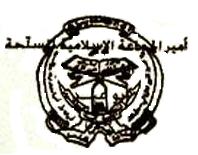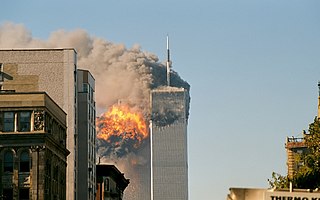Related Research Articles

Al-Qaeda is a pan-Islamist militant organization led by Sunni Jihadists who self-identify as a vanguard spearheading a global Islamist revolution to unite the Muslim world under a supra-national Islamic state known as the Caliphate. Its members are mostly composed of Arabs, but also include people from other ethnic groups. Al-Qaeda has mounted attacks on civilian, economic and military targets of the US and its allies; such as the 1998 US embassy bombings, the USS Cole bombing and the September 11 attacks. The organization is designated as a terrorist group by NATO, UN Security Council, the European Union, and various countries around the world.

Terrorism, in its broadest sense, is the use of intentional violence and fear to achieve political or ideological aims. The term is used in this regard primarily to refer to intentional violence during peacetime or in the context of war against non-combatants. There are various different definitions of terrorism, with no universal agreement about it.

Counterterrorism, also known as anti-terrorism, relates to the practices, military tactics, techniques, and strategies that governments, law enforcement, businesses, and intelligence agencies use to combat or eliminate terrorism.
Religious terrorism is a type of religious violence where terrorism is used as a strategy to achieve certain religious goals or which are influenced by religious beliefs and/or identity.

The Armed Islamic Group was one of the two main Islamist insurgent groups that fought the Algerian government and army in the Algerian Civil War.
There is no consensus, scholarly or legal, on the definition of terrorism.

An insurgency is a violent, armed rebellion by small, lightly armed bands who practice guerrilla warfare from primarily rural base areas against a larger authority. The key descriptive feature of insurgency is its asymmetric nature: small irregular forces face a large, well-equipped, regular military force state adversary. Due to this asymmetry, insurgents avoid large-scale direct battles, opting instead to blend in with the civilian population where they gradually expand territorial control and military forces. Insurgency frequently hinges on control of and collaboration with local populations.
A lone wolf attack, or lone actor attack, is a particular kind of mass murder, committed in a public setting by an individual who plans and commits the act on their own. In the United States, such attacks are usually committed with firearms. In other countries, knives are sometimes used to commit mass stabbings. Although definitions vary, most databases require a minimum of four victims for the event to be considered a mass murder.
Terrorism and mass attacks in Canada includes acts of terrorism, as well as mass shootings, vehicle-ramming attacks, mass stabbings, and other such acts committed in Canada that people may associate with terroristic tactics but have not been classified as terrorism by the Canadian legal system.
Decapitation is a military strategy aimed at removing the leadership or command and control of a hostile government or group. The strategy of shattering or defeating an enemy by eliminating its military and political leadership has long been utilized in warfare.

Aaron Mannes is an American expert on evaluation of terrorist risk. He has been director of research at the Middle East Media Research Institute and a researcher at the Information and Network Dynamics Laboratory and the Laboratory for Computational Cultural Dynamics at the University of Maryland. In 2004 he published Profiles in Terror: A Guide to Middle East Terrorist Organizations.
Political psychology is an interdisciplinary academic field, dedicated to understanding politics, politicians and political behavior from a psychological perspective, and psychological processes using socio-political perspectives. The relationship between politics and psychology is considered bidirectional, with psychology being used as a lens for understanding politics and politics being used as a lens for understanding psychology. As an interdisciplinary field, political psychology borrows from a wide range of disciplines, including: anthropology, economics, history, international relations, journalism, media, philosophy, political science, psychology, and sociology.
Paul Wilkinson CBE was a British terrorism expert and an Emeritus Professor of International Relations and director of the University of St Andrews Centre for the Study of Terrorism and Political Violence (CSTPV). Dubbed "Britain's leading academic specialist in the study of terrorism", he was a frequent commentator in mainstream British media and an advisor to the UK government.
Targeted killing, or assassination is a tactic that the government of Israel has used during the Israeli–Palestinian conflict, the Iran–Israel proxy conflict, and other conflicts.

In the years after the September 11, 2001 attack on the World Trade Center in New York City, Yemen became a key site for U.S. intelligence gathering and drone attacks on Al-Qaeda. According to the 2012 U.S. Global Leadership Report, 18% of Yemenis approved of U.S. leadership, with 59% disapproving and 23% uncertain. According to a February 2015 report from the Congressional Research Service, U.S. officials considered Al-Qaeda in the Arab Peninsula the Al-Qaeda affiliate "most likely to attempt transnational attacks against the United States."

A suicide attack is a deliberate attack in which the perpetrators knowingly sacrifice their own lives as part of the attack. These attacks are often associated with terrorism or military conflicts and are considered a form of murder–suicide. Suicide attacks involving explosives are commonly referred to as suicide bombings. In the context of terrorism, they are also commonly referred to as suicide terrorism. While generally not explicitly regulated under international law, many suicide attacks violate international laws of war, such as prohibitions against perfidy or targeting civilians. In 2019, there were 149 suicide bombings in 24 countries, carried out by 236 individuals. These attacks resulted in 1,850 deaths and 3,660 injuries.
Richard Martin Donne Barrett CMG OBE is a former British diplomat and intelligence officer now involved in countering violent extremism. Barrett is a recognised global expert on terrorism who frequently appears as a panellist in related conferences and whose commentary is regularly featured in the press.

Targeted killing is a form of assassination carried out by governments outside a judicial procedure or a battlefield.

Terrorist Recognition Handbook: A Practitioner's Manual for Predicting and Identifying Terrorist Activities is a non-fiction book about counterterrorism strategies, written by U.S. Navy retired cryptology analyst Malcolm Nance. The book is intended to help law enforcement and intelligence officials with the professional practice of behavior analysis and criminal psychology of anticipating potential terrorists before they commit criminal acts. Nance draws from the field of traditional criminal analysis to posit that detecting domestic criminals is similar to determining which individuals are likely to commit acts of terrorism. The book provides resources for the law enforcement official including descriptions of devices used for possible bombs, a database of terrorist networks, and a list of references used. Nance gives the reader background on Al-Qaeda tactics, clandestine cell systems and sleeper agents, and terrorist communication methods.
Anonymous terrorism — i.e. terrorist attacks that no group or person has been publicly claimed responsibility for — constitutes about six out of seven terrorist attacks in the world at least since 1998. This proportion has been called "surprisingly high" and is in conflict with the conventional wisdom that terrorists "mount an operation to call attention to their grievances" and to "the costs of ignoring" those grievances, which can't happen if the perpetrators don't make public the "cost", i.e. announce that an event of killing and/or destruction was their work. A number of theories have been advanced as to why terror groups sometimes don't claim an attack, including: a motivation not to force concessions from the enemy, but to punish or destroy them, by killing and demoralizing them; an interest in plausible deniability; avoiding retaliation; and a byproduct of a disconnect between terror leadership and operatives.
References
- ↑ https://cssh.northeastern.edu/faculty/max-abrahms/
- ↑ https://scholar.google.com/citations?user=k4HOzO0AAAAJ&hl=en&oi=ao
- ↑ Max Abrahms, Why Terrorism Does Not Work, International Security, Vol. 31, No. 2 (Fall 2006), pg. 74
- ↑ Abrahms, Max (2008). "What Terrorists Really Want: Terrorist Motives and Counterterrorism Strategy". International Security. 32 (4): 78–105. doi:10.1162/isec.2008.32.4.78. ISSN 1531-4804. JSTOR 30129792. S2CID 57561190.
- ↑ Abrahms, Max (2018). Rules for Rebels: The Science of Victory in Militant History. Oxford University Press. ISBN 9780192539441.
- ↑ Abrahms, Max. Lumpers versus Splitters: A Pivotal Battle in the Field of Terrorism Studies. Cato.
- ↑ Abrahms, Max; Mierau, Jochen (2017-09-03). "Leadership Matters: The Effects of Targeted Killings on Militant Group Tactics". Terrorism and Political Violence. 29 (5): 830–851. doi:10.1080/09546553.2015.1069671. ISSN 0954-6553. S2CID 146507596.